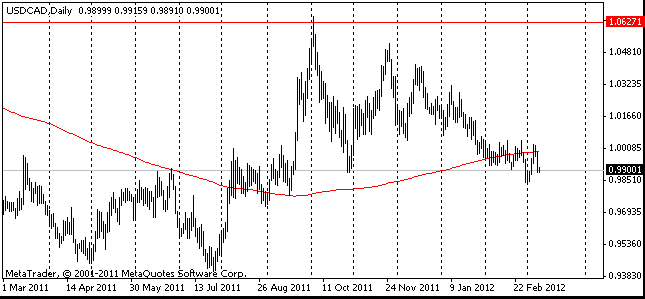EUR/usd
Bernanke didn't put forward any proposal to the markets, but the latter weren't much upset because of that. Addressing the Congress with the Semiannual Monetary Policy Report, the Fed's head highlighted rather gloomy perspectives of the American economy, but kept the tone of careful scrutiny. His speech was rather retrospective and alluding to the previous commentaries of the CB than prospective, that is pointing out the future of the policy. Remember that at the June meeting fomc decided for the extension of Operation Twist (exchange of short-term bonds for long-term bonds) before the end of the year. Then in the June commentary it was mentioned that ‘further measures would be taken' in case of further deterioration of the situation. So yesterday we heard just the same. No details. It seems that Bernanke wants to avail himself of the time he has at his disposal to get more information on the extent of the slowdown. As has been recently noted in The Economist, earlier when the Fed expanded the balance the levels of the expected inflation were lower and employment growth was slacker. Fortunately, yesterday the markets were influenced not only by Bernanke's speech. The publication of quarterly corporate reports is in full swing. The data are better than expected and this fact keeps up optimism in the markets. Bernanke's speech led to a 1% loss across the markets, but by the end of the session the losses were completely recouped and the markets even managed to gain by 1% against the opening levels. The same was with the single currency. At the time Bernanke made his speech it dropped sharply from 1.2280 down to 1.2189, but then EUR/USD was gradually bought back. Eventually the day was closed out positive and now trading is at 1.2290. Not bad. For three sessions in a row the daily candles have long shadows, but nevertheless close positive, which makes it evident that bulls prevail over bears, especially during the American session. Earlier Americans were eagerly selling the euro, now they set to purchases, though very cautiously. In other markets we can also see cautious purchases. It's quite possible that it will last at least till the end of the month and testing of 1.20 will have to wait.

GBP/USD
Yesterday's data on the British inflation proved to be rather poor at first sight. The annual rate of Consumer Price Index made just 2.4% in June against the expected 2.8%. Over the month prices for goods and services have dropped by 0.4%. However, this was mainly connected with the seasonal discounts of retailers. They were a bit larger than usual as sellers had to struggle fiercely for customers. The sellers don't have much choice as the pound is rather high against the euro. At the beginning of the crisis, when the sharp interest rate cut by BoE caused sales of pounds for euros, sellers benefited from the great number of customers from mainland Europe. Since then not only customers from Europe have become poorer because of unemployment growth, but the exchange rate itself has reached the highest point in 3 ½ years. On the other hand, under such circumstances the issue with inflation is unlikely to stand any longer. It remains to hope that this will make the British CB more ingenious in the search for lending incentives.

USD/JPY
USD/JPY has been struggling for the 79 handle for three days in a row. The drop of the pair from 79.20 to 78.60 and the decline in EUR/JPY down to 96 that we saw on Monday were followed by angry comments of Finance Minister Azumi. Yet the markets have already got used to the fact that Japan is an old dog which barks a lot, but doesn't have enough strong teeth to bite. We still believe that the yen is expensive for no reason and it won't last for long. However, we expect that the reversal in the dynamics will be accomplished by the market and not due to the efforts taken by officials.

USD/CAD
Yesterday the Canadian CB kept the interest rate unchanged at 1.0%. Anyway, the accompanying commentary was largely focused on the external risks, which, as been said, can be incurred both by developed and developing countries. Against such a background the Bank revised its forecasts towards more measured growth of the economy. This means that the probability of the rate increase, which was embedded in the quotes in spring, will fade away soon. Nevertheless, it is in no way hampers strengthening of the Loonie. Everything's relative in Forex and at present the Canadian CB, geared up for tougher measures in the future, looks more warlike than most other CBs of the developed countries.
